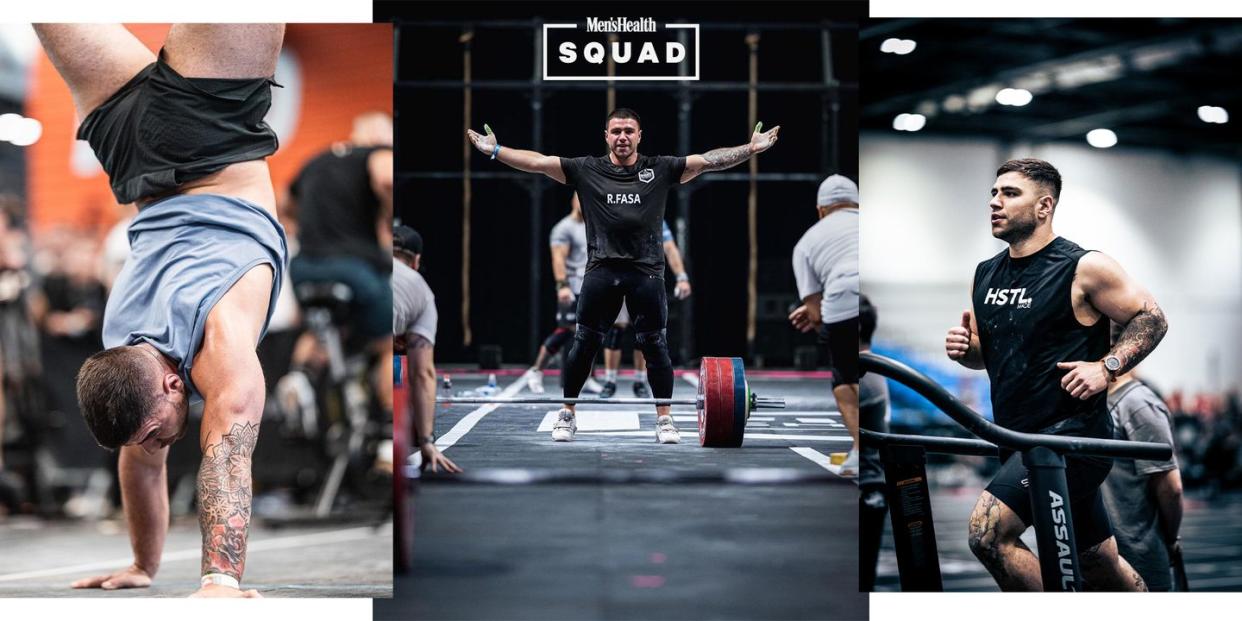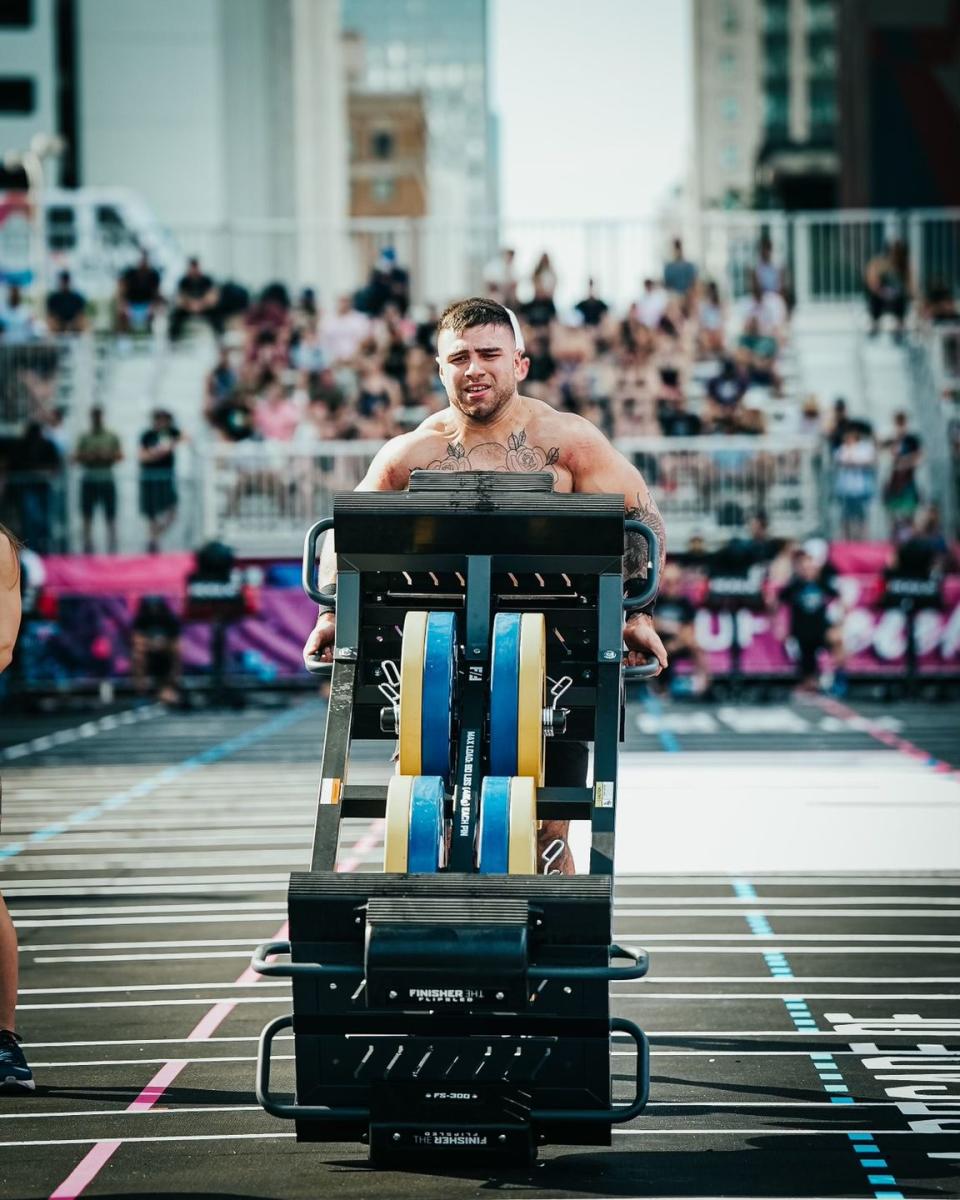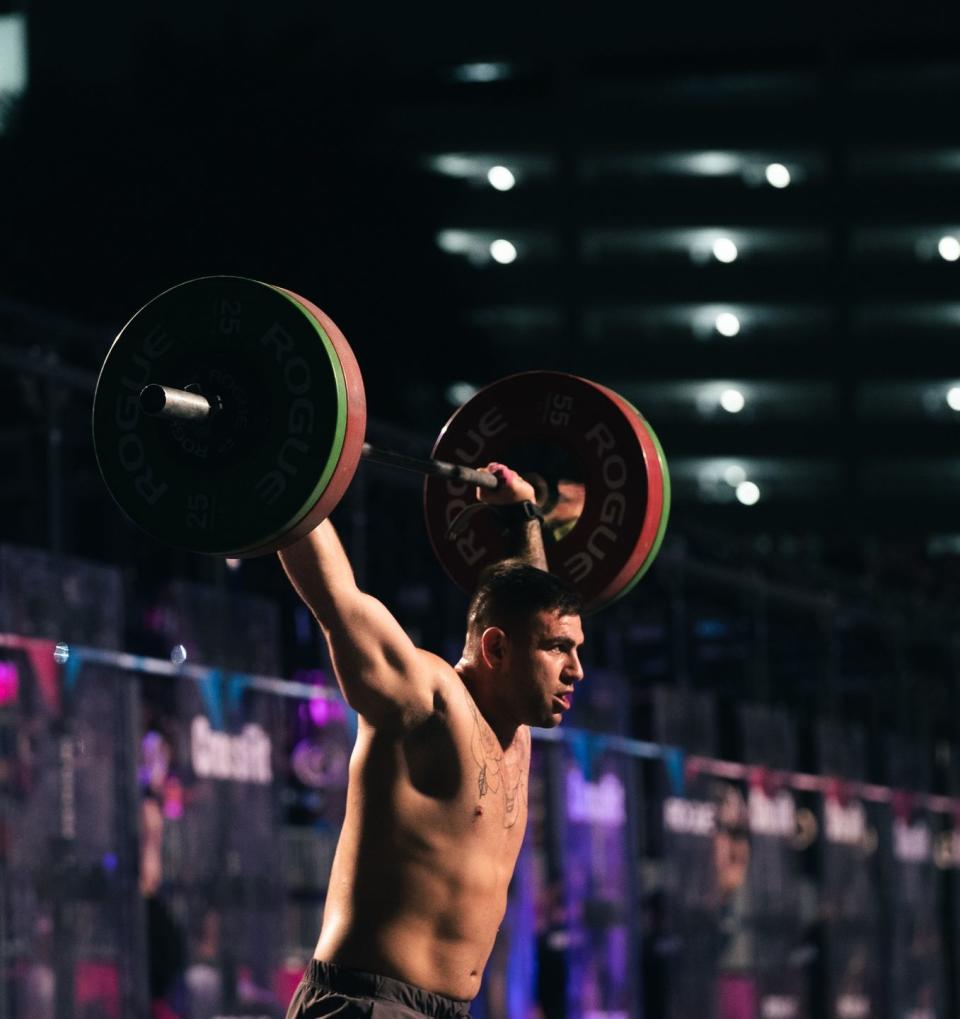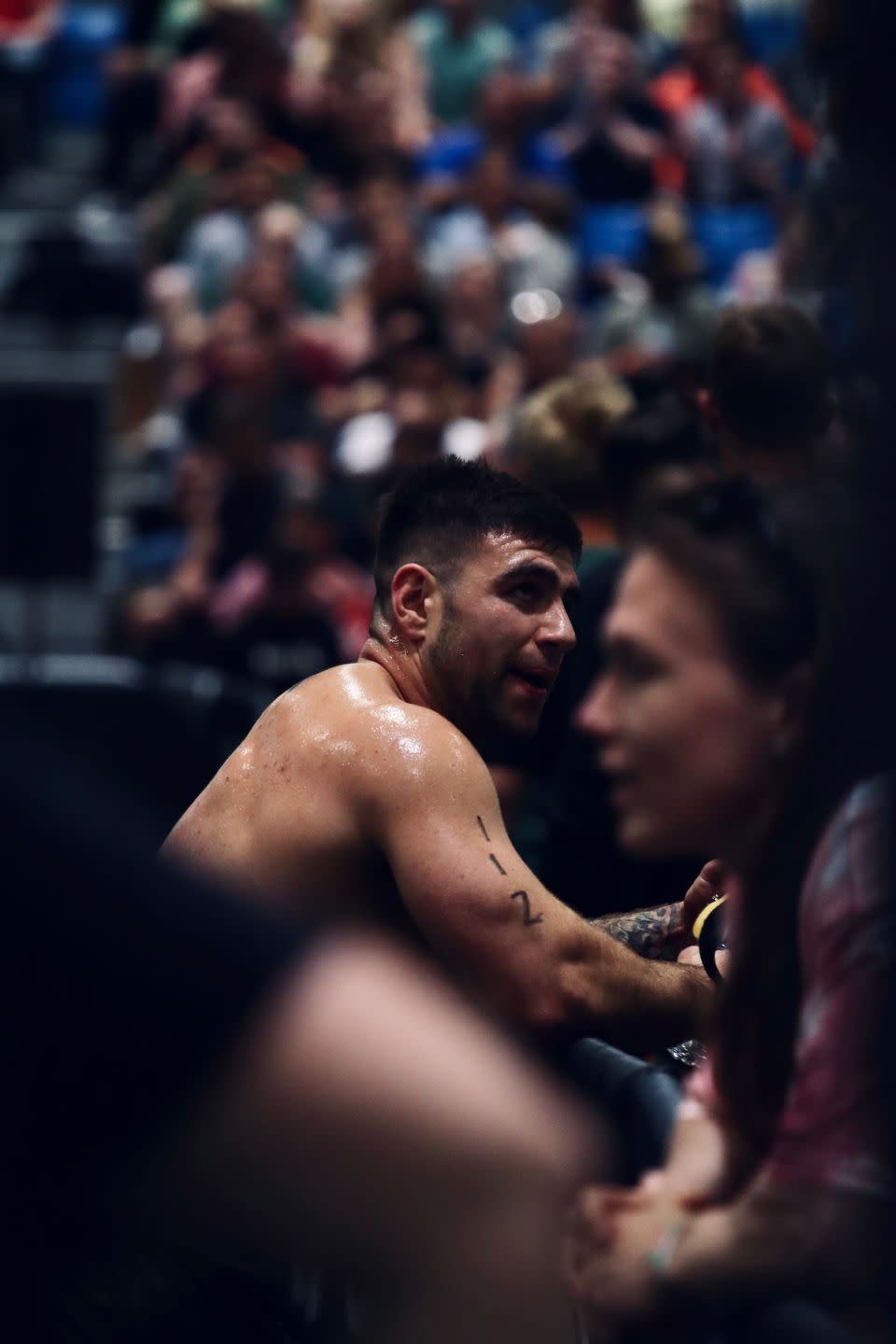CrossFit Sensation Reggie Fasa Talks His Journey from Labourer to Elite Athlete

Competitive CrossFit, at the highest echelon of the Sport of Fitness, is a tough game. The supreme feats of physical strength, skill and conditioning displayed by the elite athletes who take the floor at the marquee events of Wodapalooza, the Dubai Fitness Challenge and, of course, the CrossFit Games, are as inspiring for us all as they are unattainable for most. The shiny men and women at the 'tip of the spear' do not quite seem real.
Reggie Fasa is real. The man from South Shields on the outskirts of Newcastle, who not long ago would train every day after eight hours as a labourer, is a real as they come. He finished the 2023 NOBULL CrossFit Open – the initial stage of qualification towards the CrossFit Games – placed first in the UK, first in Europe and ninth in the World. It is the highest position recorded by a UK male on both the European and Global leaderboards.
Men's Health spoke to Reggie between the conclusion of The Open and start of the individual quarterfinals, now underway and concluding on the March 19th. He told us how he found his way to the peak of CrossFit via the basecamps of high-level rugby and marine engineering, why being put on furlough was the best thing that could have happened to him and why he's the Geordie sure to chew the ears off the post-event reporters.
Men’s Health: Did you take some time off after the Open finished?
Reggie Fasa: I had two days off in the Lake District with my girlfriend, for a total reset. Just to chill out, because I've learned whatever goes up must come down. I feel like taking those days off, even when you when you’d rather ride that wave of emotion and motivation, is a bit of a trap. You can fizzle out. The Open really doesn't mean much to the top tier of the athletes at the minute, but you earn your rest and it gives you a bit of a reward going in the quarterfinals. It’s emotional more than physical. My body feels sound, but emotionally I’ve had that reset, so I'm ready to go again and an attack the quarterfinals. I'm flying out to Finland for it, so I'll be doing the workouts there with [perennial Games athlete] Jonne Koski. I need to give him some numbers to chase…
MH: Although the Open is a formality for the athletes at your level, is it still draining?
RF: It’s the stress of camera setups, making sure everything's recorded right and the measurements are all bang on that really puts a hit on you. Especially if you're in a gym that really doesn't understand the level that you’re pushing at. I'd say it's quite hard. But luckily, I've got a great group of people around me that take some of that stress off and that's why I wanted to go over in Finland. Not only will I be training with and going against quality athletes, we're all going to help each other with set up, the measurements and all that. We can switch off, concentrate on the warmup and execute the workout to the best of our ability. It's gonna be a good time. I didn't realise how cold it was going to be though. It’s going to be -8. When it’s 2 degrees here, I’m freezing.
MH: Where did you grow up and what sort of sports did you play at school?
RF: I’m from a place called South Shields. It's about 15 minutes from Newcastle. If anyone ever asks where I'm from, I normally say Newcastle. I started rugby when I was young and I wasn't great to begin with. I was always keen but then in my last year of school, when I was 15-16, that's when I really started making headway and played county and North of England. I got a sports scholarship to a boarding school called Barnard Castle, which was a big, big change.
It was only 45 minutes away from where I lived but with the scholarship you had to board. So it was a totally different climate. We had Saturday school and went to chapel every day. I was used to playing out with my mates at night, or getting up to some mischief in the parks. Now I’d be in prep between half seven and a half nine every night. I didn't really take that seriously until the headmaster came round with his two dogs and walked into my room while I was having a party in my room with all the lads. I struggled not getting on with everyone and there were a lot of small jobs that we had to do, like being up at certain time, going to chapel every day and so on. But once I embraced that, it was was a great learning curve and I really had a great time there. It was a boarding school with lads and lasses as well. So yeah, it was fun...
MH: It sounds like Hogwarts. What was it like as environment for your personal development?
RF: When I first pulled up in my parents’ car, I didn’t know what I was doing there. There were about 12 rugby fields. I went from training once a week with my state school, playing on the Saturday and playing for my club on a Sunday, to training five times a week and doing strength and conditioning sessions in between. I was surrounded by people who strive for a little bit more when it comes to learning, training and all the little things. There are always distractions but there were fewer distractions there than you'd find at a state school. They just wanted to achieve and being around that, you level up without knowing. I think having that professional outlook and how athletes train was the first step towards becoming a full-time athlete. Some of us would go and play for Newcastle twice a week to train. It was it was an eye opener.
MH: Was your plan to play rugby professionally after school, then?
RF: Totally but that came to a sudden stop when I got glandular fever. I feel like things happen for a reason and I had so many hiccups in my last year of school. Just before the North of England trials I had glandular fever and just before the Newcastle trials I hurt my ankle. There were so many signs out there telling me not to not chase this rugby dream. When I didn’t get a contract from the Newcastle academy onto the next stage, I got a bit of a reality check, as I didn't have anything else in place.
I decided to go for marine engineering. There are about three colleges around the UK and I was fortunate enough to live on the doorstep of one in South Tyneside. My uncle was a chief engineer for Shell and it sounded like a good career. You had to get sponsored and I got sponsored by an offshore company. I'd be away for four to six weeks, come back for a couple of weeks, then go back away. That was when I first started dabbling in CrossFit.
When we were away on the ships, obviously there weren’t any good gyms. With the ship rolling around on the waves, it wasn't really safe to have any proper weights, so we made our own. We made a bench press out of some drums filled with water. When the ship was going up and down on the waves, one rep the weight would feel super light, the next like there was 200 kgs on the bar. It wasn’t a perfect setup but I got by. I wasn’t seeing any progress in CrossFit, though, and I felt like I was losing all the gains I was making at home every time I went away on the ships. I though I was wasting my youth because the job itself was so easy. We would break things just to fix them and pass the time because it was so boring down there in the engine room.
I made the decision to leave and work with my dad as a labourer for his building company. And that was a definitely a reality check. I thought, as the son of the gaffer, I would get a cushy ride. Instead, I got all the shit jobs. I did that for three or four years.

MH: What drew you to CrossFit in the first place?
RF: One of the rugby lads owned shares in a box and he got the rest of us up there for some strength and conditioning sessions. The first session was the O’Neil test – four minutes to get maximum distance on the rower. The coach said that he’d pay for Nando’s that night for the winner. That was me sold right there. There was me at five-foot nothing versus all the huge lumps in the second row and back row and I won it. I started researching CrossFit myself more and it was the competitive edge that got me hooked. You didn’t have to rely on anyone else. When I stepped back down to club level, people didn’t really care about losing. They just wanted to get on the piss afterwards. I’d fallen in love with the game playing with lads who were passionate and striving to be the best but was now playing with lads who didn’t really care if they were getting pumped. That’s when I hung up the boots. Some people, especially in rugby, like to hide in the shadows. They can get around the park without putting the hard yards in.
In CrossFit, you can’t do that. You get found out straight away. It’s all on your own performance and nobody does the work for you. You can get guidance with all the programmes that are out now that people are jumping on left right and centre, trying to find the magic pill. But at the end of the day, you’ve got to do the work.
MH: At what point did you feel like you were getting good?
RF: I felt like it was when I qualified for Wodapalooza. There were 20-odd Games athletes out there and I won the row event. And like I said, I'm not the tallest button in the box. We had all 40 boys out on the floor at the same time and the pace started at 1:55/500m. Every 30 seconds the pace picked up and if you got caught by the pace boat, you were out. I remember getting halfway through and it wasn't getting much harder but all these big names started dropping out. In the end it was only two of us left and Travis William tried to bang a big pace in, so I just matched it. With a minute to go, he realised I was too far ahead and he didn’t want anything to do with it. When I got off the row the endorphins kicked in and I was sound. I did an interview with an American reporter and I was just chewing her lugs off! She didn’t have a clue what I was on about. That was my first bit of success and showed that I had the capacity; that it just took a bit of grit for me to be knocking on the door of all these Games athletes.

MH: What changed for you to make that leap?
RF: It was being on furlough, for sure. It was really a saving grace for me. I was still getting paid and it opened up a window for me, not only just to do more training, but without labouring for eight hours a day. Not being fatigued from grafting at work gave me the energy to get more bang for my buck. That’s what really made the difference. I got offered the chance to go full time as an athlete down in Wigan. We probably overachieved that year and we finished first in Europe in the quarterfinals.
Funnily enough, all the sponsors that we asked for help at the start, who said they had no budget, suddenly found some once I was doing quite well. I think that’s the problem with CrossFit as a sport at the grassroots: you’re either the best and get all the sponsorships and money so you can stay up there, or you’re not close and you don’t get anything. There is such a huge difference between being the best and climbing through the ranks. That’s what needs to be fixed. In football or rugby, you get support at the grassroots and you go up through the ranks in the right order. Whereas in CrossFit, you’ve got to be up at the top and winning to get all the sponsorships, even though you don’t need them at that stage. It’s the middle ground where it’s hardest.
MH: What would be your advice for somebody trying to make the leap from being the that middle ground to the next level?
RF: I would say that it doesn't get any easier when you when you go up a level. It gets a harder. Especially when you're getting close to the top. There is the pressure of sponsorships and performance, so there is a fair amount of stress. People think that I've got all day to train, but it’s not as easy as it sounds and you've still got to do the work. If anything, when you’re working during the day, it makes you miss the gym. When I was on site eight hours a day, I couldn't wait to go training. I would have all this this motivation every day to go to the gym. Whereas when you've got all day to do it, getting up for training can be hard sometimes.
When it comes to getting better, don’t just set yourself goals but break it down into smaller, manageable pieces. When you boil it down to eating right, sleeping well and training hard, that big goal that seems a million miles away, actually becomes achievable. When you tick off the little things that you can do every day, and do that over a few months, you’ll find you’re knocking on the next door. When I first started watching CrossFit on YouTube in 2017, I thought they were superhuman and using every minute available to do training. But really that’s not the case. You’ve just got to manage your time, prioritise training for the hour to two hours and think about what you can do to improve on the other 22-odd hours of each day.
Most people get put off by the bigger picture and they get scared. They are scared to really say dreams out loud because they are worried they’ll fail. You shouldn’t be scared of failure. It’s what brings out the best in people.

Men’s Health: What has made the big difference for you this season?
RF: I got to a point last year where I wanted to de-stress and take myself away from a coach. I just wanted to find a love for the sport again because I'd really fallen out with it. I had three months off, still training hard, and I really found myself again and enjoyed working on some weaknesses for myself. I showed I could do it myself and plug some holes. But it’s about spinning all the plates at the same time – one minute you get strong and then your gymnastics drops, then you concentrate on that and your engine takes a hit. You’ve got to keep those plates spinning, not only at the same time, but at the right time to peak for competition. That’s something I’ve always struggled with.
I spent some time and got close to some Game athletes in Dubai, like Kahn Porter. He’s a character. Jonne is a sound guy, so are Luka and Lazar Dukic. They are all very humbling to be around. At that level no one has an ego and I was quite shocked in the warmup area how much everyone gets on. I was just sat there texting someone on my phone and Brent Fikowski came up to me. We were getting ready to go out for a legless rope climb event and I didn’t do great on that movement at the semifinal in 2022. It probably put me out from getting to The Games. Brent comes over and goes “How are you feeling about those rope climbs, Reggie?” He’d done his homework on me, knew my weaknesses and was having a bit of fun to try and get in my head.
Later in the competition, we were in the changing rooms and Brent’s got his phone out looking at it sideways. I knew he wasn't going to be that strong on the hang clean coming up, so I turned to him and said “Brent, it's too late for you to be looking at tutorials on YouTube now. All the works been done in your legs!” A few lads started laughing and me and Brent just really got on after that.
It was a good time in Dubai and that's when I got close to Koski and Khan. They told me I should try and jump on The Training Plan with them. For me, I know I can train hard by myself. But being able to have training camps with that calibre of athlete just knocks you up a level and gives you a reality check of where you are on some things. Then you can go back and work on them yourself.
When I reached out to Jami [Tikkanen] initially, he took a good week to get back to me. I was baffled. It was like asking my dad for my job again. When he got back to me, he was just honest about not wanting to take anything away from the athletes he already had and said that he didn’t want to underserve me, or not have the right time for me. I totally appreciated that and we agreed he'd take a couple of weeks to digest it. We got to work in January and I’ve made such progress with him in such a short time. He’s a wizard.
MH: What are your goals for the rest of the season?
RF: I want to qualify out of quarterfinals and get into the top heat for the European Semifinal. That way, when we go to Berlin, you know you're going to be in the best heat and you’ll know the scores to beat. Then it’s just execute in Berlin and qualify for The Games, really. I've shown a few times that when the workouts suit me and I'm doing well, I'm mixing it with the best. It’s just bringing everything I struggle with up a bit.
MH: Finally, what would say to someone's who is on the fence about trying CrossFit for the first time?
RF: You've just got to get in there and try it. No one can talk you into it, or explain it if you don’t already know. When you first start, you'll have amazing progress straightaway. I've had loads of my mates saying they are going to go pro because they rattle off 10 double-unders within the space of a week, or they've done their first kipping pull-ups. Of course, it doesn’t quite work like that but the point is CrossFit humbles you. You can go into a class and think you’re good at running and then you get humbled by Janet, who’s 56 and lashing it around the block. That’s what’s so great about it.
You Might Also Like


